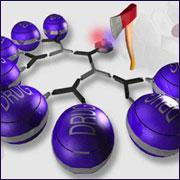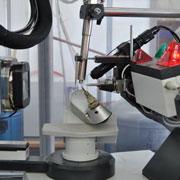Applied Research in the School of Chemistry
-
Residual cancer cells can initiate renewed cancerous growth even after the surgical removal of a tumor. Prof. Doron Shabat develops molecular sensors that will mark malignant cells, so the surgeon can remove each and every cancer cell.
Article about the research >
-
The research of Prof. Aviv Amirav is aimed towards the development of novel analytical instrumentation to aid the detection and analysis of environmentally and ecologically important pollutants, fuels and petrochemicals as well as pharmaceuticals and drugs in bio-fluids. Special emphasis is given to collaborations with the international analytical instruments industry.
-
As appliances and devices shrink in size, the need for efficient miniature batteries grows. Prof. Emanuel Peled and Prof. Diana Golodnitsky are developing tiny batteries to be lodged in ingestible capsules for medical use, or in minuscule sensors for security purpose.
Article about the research >
-
Enstorage was founded on the basis of technology developed in the lab of Prof. Emanuel Peled at the school of chemistry. Its aim was to develop and manufacture a very large energy storage system (hundreds to thousands of kilowatts) for alternative energy storage (wind, solar). The system is based on a regenerative fuel cell, where the same unit is used as the electrolyzer during the storage period and as a fuel cell during the energy withdrawal period. The idea is to store energy during low demand hours (such as night time) and return to the grid during high demand hours. During the storage phase the electrolyzer produces hydrogen, stored in a tank, and tribromic acid (remains in solution). During discharge, the hydrogen flows into the fuel cell and oxidizes to protons, while the tribromic acid is reduced to hydrobromic acid. The first laboratory scale cell was able to produce one Watt. Recently, Enstorage demonstrated a 50 kW system, and is now developing a 150 kW system for installation in France in cooperation with AREVA and Schneider Electric.
-
The lab of Prof. Gil Markovich is developing transparent electrodes based on tiny networks of metal nanowires. These networks will be the basis for fabrication of flexible plastic displays which will be used in future flexible devices, such as flexible mobile phones, computers and large displays.
Article about the research >
-
Promoting personalized medicine. Out of 450 research proposals, nine were chosen, one of them submitted by a group of seven EU-based researchers, coordinated by Dr. Yuval Ebenstein. Based on a technology that allows reading information from individual DNA molecules, each scientist will apply their particular expertise for extracting and using this information for clinical diagnostics. At TAU, a method is being developed for detecting damage sites along the DNA, and detecting cancer at a very early stage, which can also provide guidelines for choice of treatment, tailored to an individual’s own DNA. The research group was awarded €6 million for the research project.
-
Dr. Yuval Ebenstein and Dr. Yael Michaeli from the School of Chemistry produce fuel from algae. They believe that these primordial sea organisms are a promising energy source with significant advantages over other biological sources.
For further reading (Hebrew) >
-
The research group of Prof. Fernando Patolsky has developed a nanotechnological sensor which identifies very small amounts explosive molecules. In the future, such sensors could serve various security applications, such as airport security systems, shopping center entrance security, train stations, and more.
For further reading (Hebrew) >
For further reading (English) >
-
Reversible fuel cells are one of the promising solutions suggested for storage of renewable energy, and would replace the current lead and lithium rechargeable batteries in use today. The lab of Prof. Emanuel Peled is working on the development of new types of fuel cells.
For further reading (Hebrew) >





